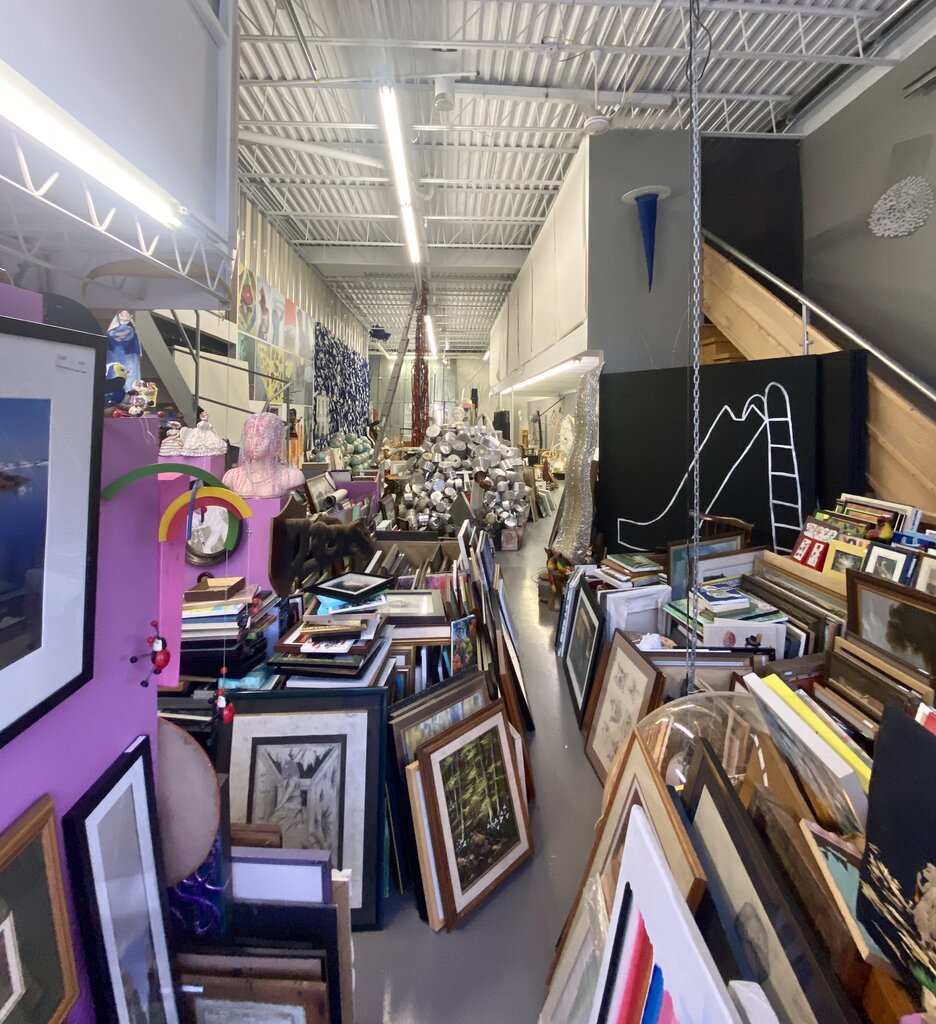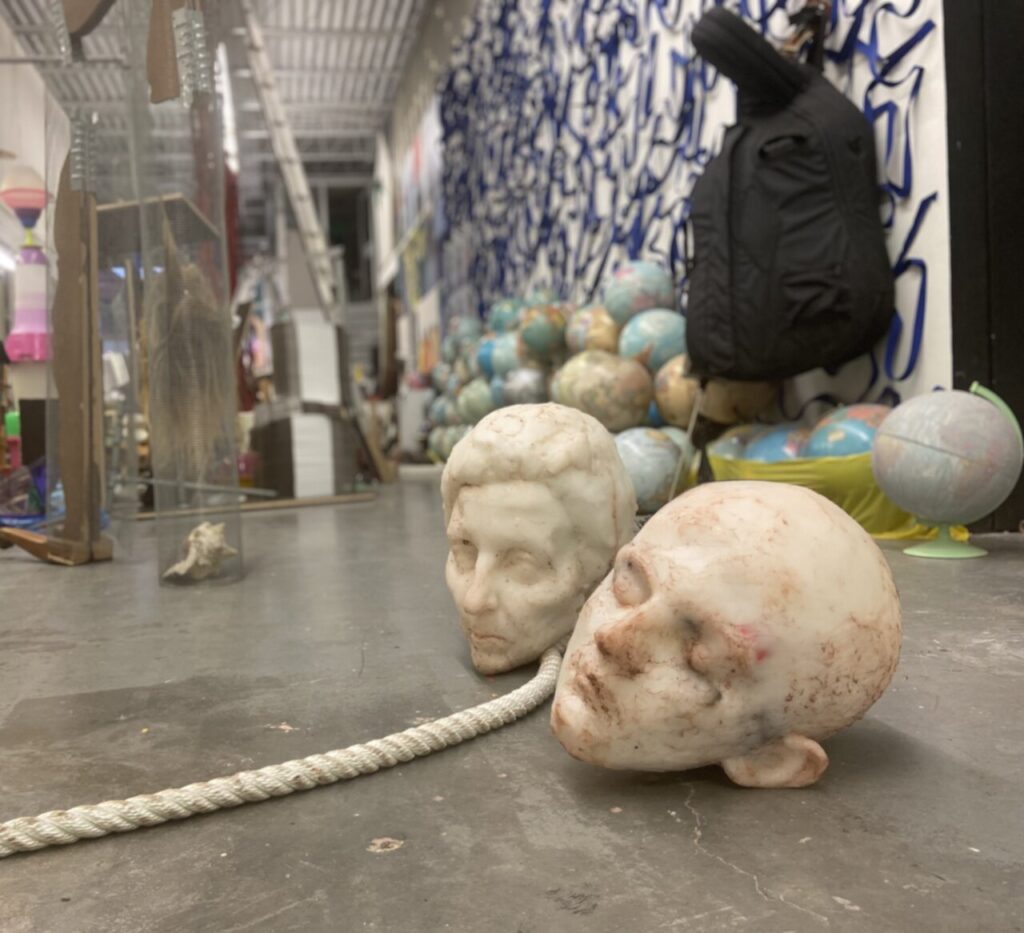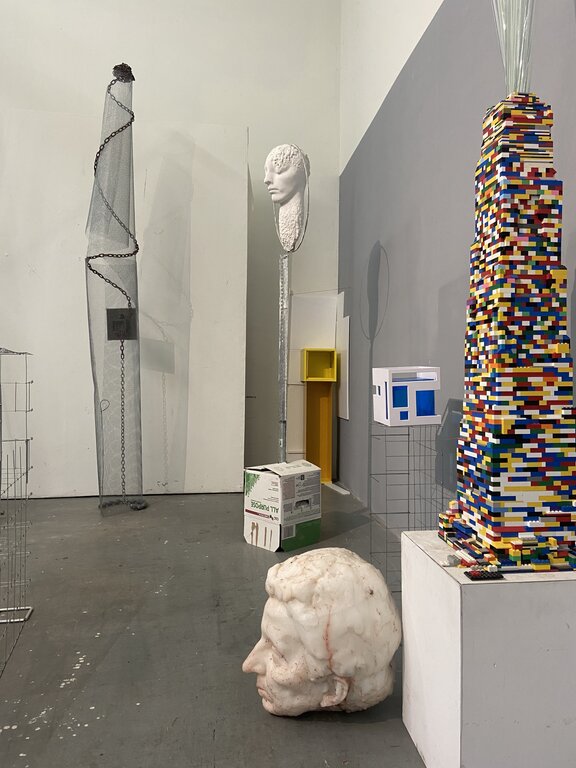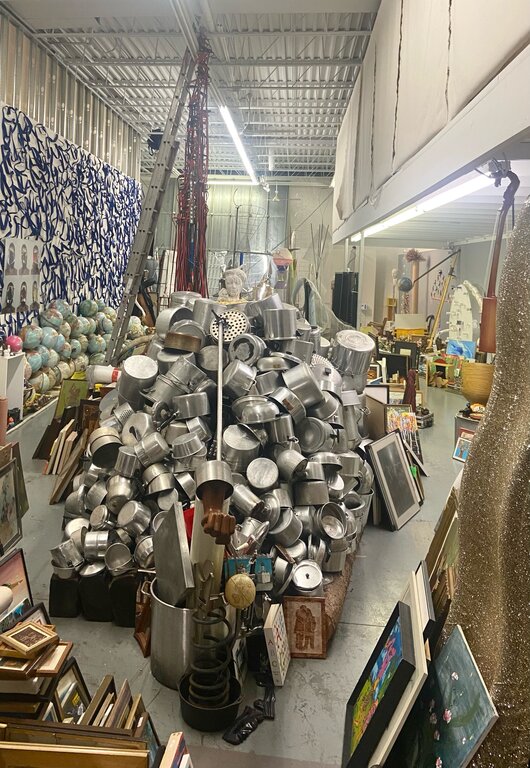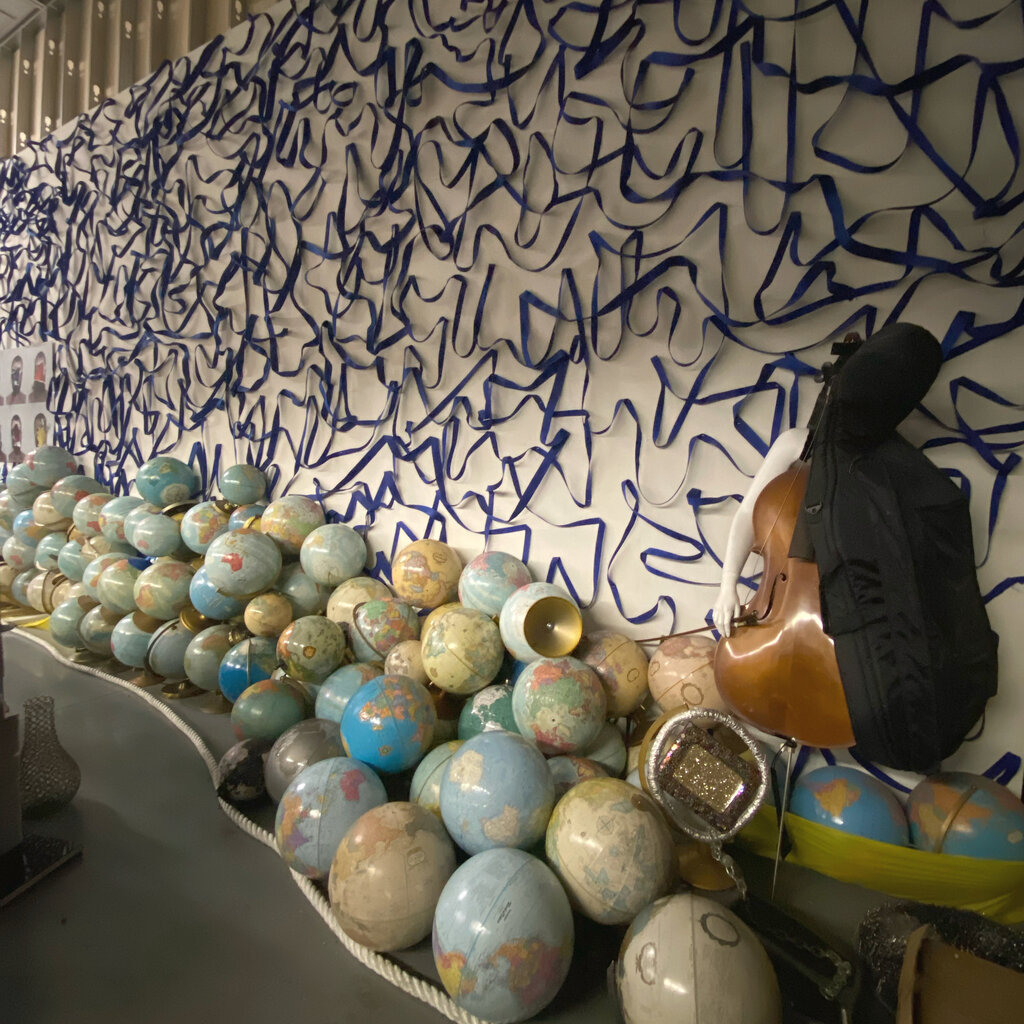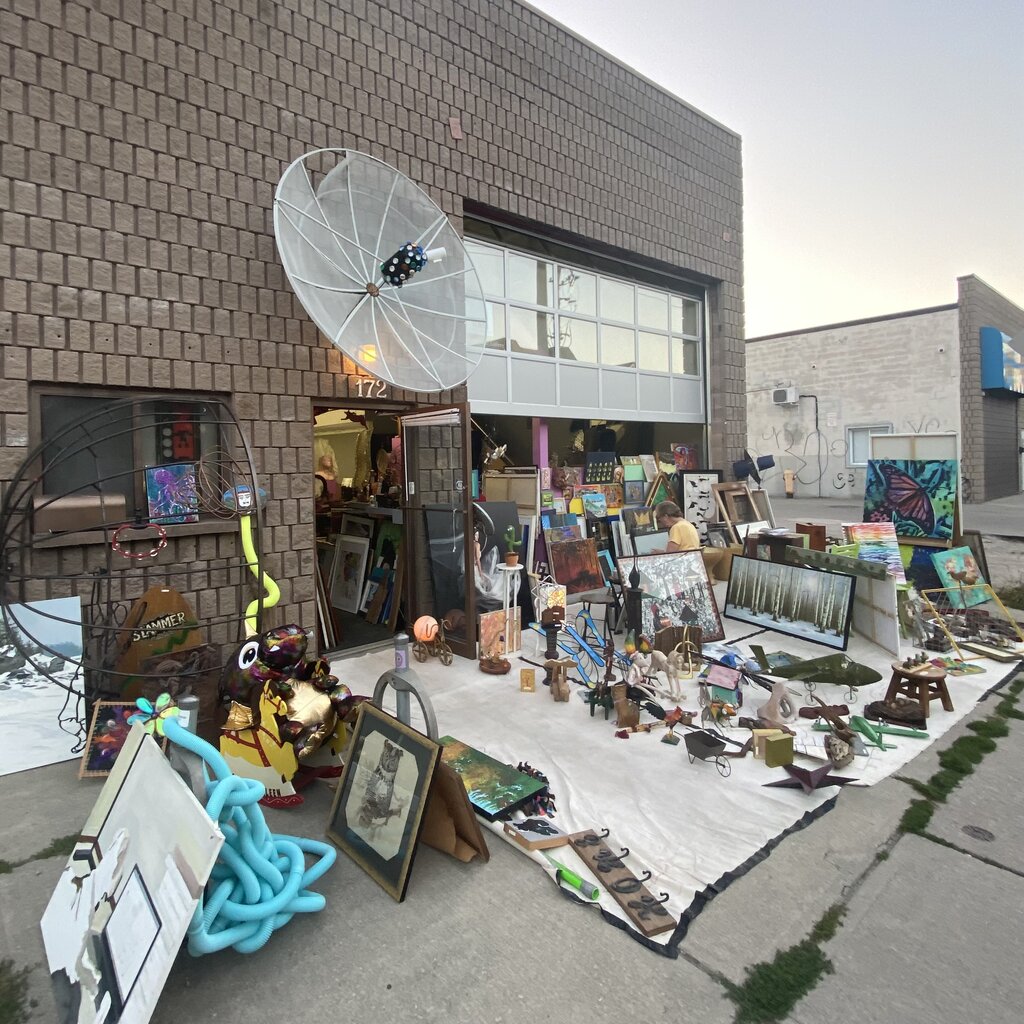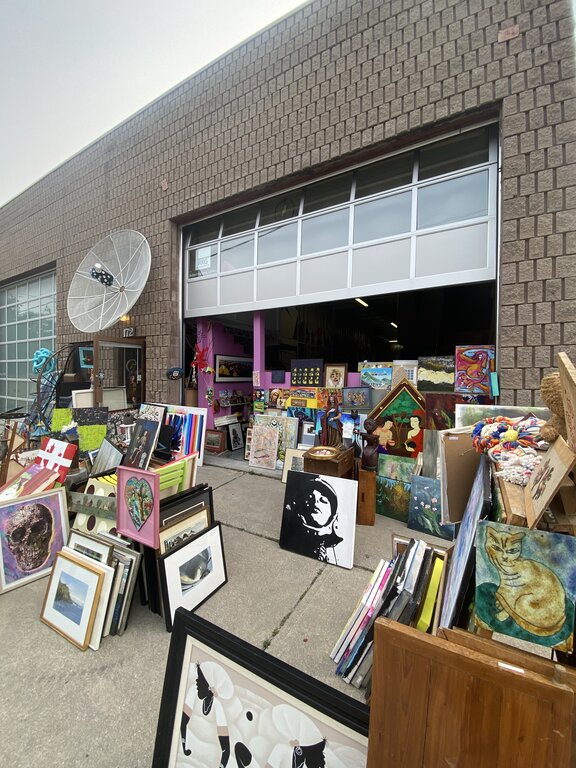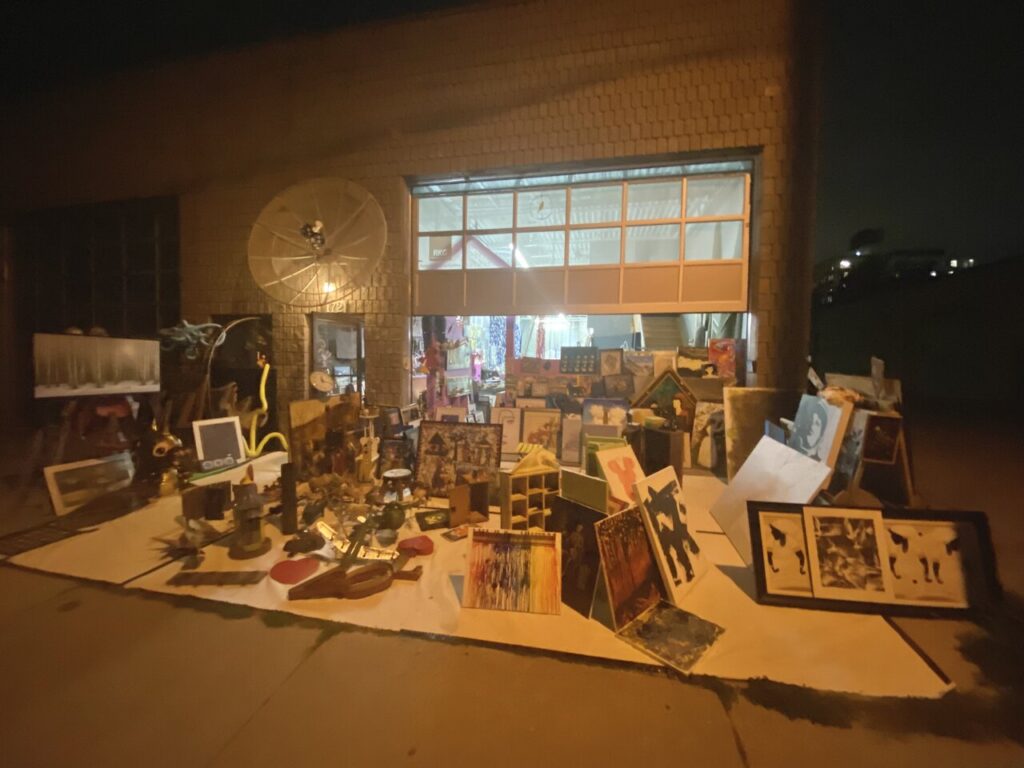Trying to enter the Robert Kananaj Gallery (RKG) on St. Helens Avenue, for this exhibition presents the visitor with a challenge. The gallery is filled with so many artworks — close to 4000 pieces — piled up layer upon layer, leaving a very narrow pathway to navigate all the way to the back of the space.
Installation view inside of the gallery
Inside the gallery you still can see the previous exhibition, Times of Reflection. What you experience here is Robert Kananaj’s “all-one project”. Times of Reflection is Kananaj’s biggest forthcoming body of artwork, filling the entire gallery. Talking about the project, Kananaj said: “When the gallery had to shut down for months, because of the pandemic, I decided to step in and create unusual big installations, so letting coexistence in unusual company of unknown to us.” He created sculptures both in figurative and abstracted styles. Some of them are large busts of heads on the floor or full-figure depictions hanging from the ceiling or placed on spikes.
Installation view Times of Reflection, 2023 by Robert Kananaj
Memory is Blind, Memory is Deaf, sculpture, resin, 2023, by Robert Kananaj
Sculpture, installation view, 2023, by Robert Kananaj
There are also large installations like the numerous cooking pots creating a hill in the middle of the gallery (Cooking pot society). Another one, Tribute to the Ukrainian Flag, covers the entire left wall
Installation view with Cooking pot society, 2022 by Robert Kananaj
Installation view with Tribute to Ukrainian Flag, 2022-23, (on the wall) and globes and cello by Robert Kananaj
“Times of Reflection is always within change, studio experience and gallery experience merge in to an unconventional one. The one of the visitors’ take.” – points out Kananaj, and adds that the visitor’s exclusivity is very important for him.
Roberta Laking Kananaj, co-director of RKG, explains that when the pandemic happened it was hard to have exhibitions as no one wanted to come inside the gallery. So, Robert Kananaj, the director of the gallery thought that they needed to figure out something else. The gallery had always collected random things from unknown artists so the idea of organizing an installation around them was born. They started to put together an Installation outside the gallery as a continuation of the inside show and called it Salon des Refuses, later Renaissans des Refusés. While the pieces in Times of Reflection are original and unique artwork created by Robert Kananaj, Renaissance des Refusés addresses anonymity.
More than a century ago, the original Salon des Refusés was created in protest against the Paris Salon of the Academy of Fine Arts that had held themselves out as the judges of the epitome of status. After the liberation of the Academy, those refusés became the new benchmark of status. “In contrast, and long overdue, RKG’s Salon des Refusés says Enough — Status is overrated!” – wrote Kananaj. Then he continued: “Salon/Renaissance des Refusés is about refusal. Models are by the very nature exclusive. Not everyone can fit in a model. Models are failing, historically, to vast majority of people, all walks of life. That’s why it started as a Social Commentary Project, installation with unknown makers and artworks, not for sale. So, creating status out of status-less. We are conditioned all to serve the status, and the status can’t accommodate us all. Models are destined to fail, but no one individual can afford to overlook one self’s status. Status is in out, individual, and not out in. Rejected (art and individuals) are individually recognized rather than by a model.
The gallery gives in for the unknown visitor. The gallery is to be what the visitor makes of it, in the presence of maximal information by unpredictable known disorderly presentation we have individual minimal take. The order comes from the individual context, artwork or individual person.
That’s why I say status is overrated, referring to the models’ limitations to accommodate us all.
So, the status is individual.
It’s more about what is going on at RKG situation, besides disturbing or comforting. It is readymade not for any status, other than letting the visitor, for the first time in our 12 years serving as a gallery, to be where they are always: living proof of our individual unique life.”
Roberta Laking Kananaj added: “The installation inside and outside the gallery contains pieces that someone abandoned, but it doesn’t mean that they are worthless. Somebody might be interested in them and want to buy them.”
As the introduction of the show states: “RKG’s Salon des Refusés is about the visitor and art. Pieces with little chance to become part of institutions of the status-building kind, have taken over the gallery space. We may look down on this invasion, or be tempted by it. A successful individual in whatever walk of life doesn’t seek status, as excelling and becoming are unique for everyone. Here the refused are given status by the status-less, and so the Salon des Refusés of status-seeking has come full circle. Receiving is giving.”
Roberta Laking Kananaj added: “The installation never looks the same as Robert Kananaj picks different items every day and arrange them in a different order. People can touch them, move them, have fun with them. RKG became a popular destination during the pandemic and after, as people who worked from home, or children after school, or someone trying to find a last-minute present came to browse around till 11 pm or even midnight. It became a fancy place to visit for locals and artists, as well as tourists.”
Images are all installation views and courtesy of Robert Kananaj Gallery
*Exhibition information: Renaissans des Refusés, ongoing, Robert Kananaj Gallery, 172 St Helens Avenue, Toronto. Gallery hours: Wed – Sat 1 – 5 pm or into the night if weather permits.

